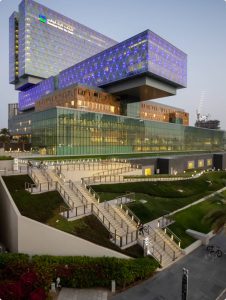ABU DHABI / WAM
M42, a global health leader powered by artificial intelligence (AI) and technology, has called on healthcare, technology and academic leaders to join it in the battle against disease by shifting the focus of the healthcare industry from sickness to prevention, in a keynote speech by its Managing Director and Group Chief Executive Officer, Hasan Jasem Al Nowais, at the Longevity Forum.
He noted that humanity is facing “severe threats to health” and nations all around the world are under crippling strain with the rising burden of healthcare spending — with estimates reaching $10 trillion by 2026 – Al Nowais emphasised the unsustainable nature of the current sickness model and called on global leaders to come together to forge greater collaboration on AI and genomics to progress the prevention agenda.
Speaking at the 7th Annual Longevity Forum, along with Jim Mellon, Co-founder of The Longevity Forum and Richard Meddings, NHS Chair, Al Nowais introduced the audience to how M42 is developing AI algorithms and solutions and integrating them into patient care to help disrupt traditional healthcare models.
As Along with M42’s open-access clinical large language model called Med42 and pioneering AI-powered chest X-ray for early detection of tuberculosis, Al Nowais also detailed how M42’s Cleveland Clinic Abu Dhabi — where Al Nowais also serves as Chairman — is integrating AI into endoscopic colon screening with algorithms analysing endoscopic images and videos to identify abnormalities, lesions and potential signs of cancer to help doctors create personalised treatment plans and remove precancerous polyps. “The key here is early detection and diagnosis, and then prevention,” he said.
“With AI, we’re increasingly able to take vast amounts of data—from patient records, lifestyle factors and genetic information—and use it to identify high-risk individuals long before symptoms arise.”
On genetic testing and genomics, Al Nowais hailed these as “the most transformative developments in preventative medicine” enabling healthcare practitioners to “look into the future and to make early interventions that are tailored to a patient’s unique DNA.”
Presenting a case study of how M42 is remodeling the healthcare system to one that drives early diagnosis and preventative action, Al Nowais mentioned a 36-year-old female patient who had a family history of colon cancer and whose mother had a mutation in her MLH1 gene, which is associated with Lynch syndrome, a genetic condition that significantly increases the risk of developing certain types of cancer.
Al Nowais detailed how with genetic testing, while the results came back negative for the MLH1 gene, the patient was positive for a BRCA1 gene mutation, which is associated with hereditary breast and ovarian cancer. Due to M42’s advancements in this area, the patient was able to identify a risk early on and is receiving increased observations and risk-reducing interventions for cancer prevention.
Calling on global leaders to join forces, Al Nowais further commented, “Together, we can march for the benefit of our people and the world. Health is a universal human right and preventative care is critical to reducing the immense health disparities that exist globally. As we push the boundaries of innovation, we must ensure that these advancements are accessible to everyone—regardless of geography or economic status. The democratisation of care is vital for global health.
“The message is clear: the future of the world is in healthcare, and the future of healthcare is prevention, and the future of prevention is collaboration. We must work together, across borders and sectors, to pool our knowledge and resources. The stakes are too high for us to act in silos. Whether we’re talking about sharing genomics data, developing AI-driven models of care, or reforming outdated systems, we literally cannot afford to work alone.
“Prevention is the battleground where diseases must be fought if we are to have any chance of transforming healthcare and benefitting humanity. I ask you to join the fight!”
 The Gulf Time Newspaper One of the finest business newspapers in the UAE brought to you by our professional writers and editors.
The Gulf Time Newspaper One of the finest business newspapers in the UAE brought to you by our professional writers and editors.
